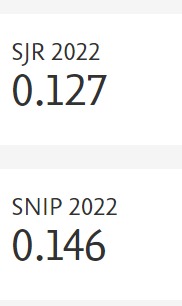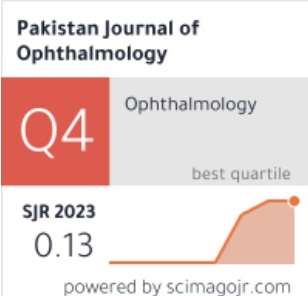Role of Operative Subconjunctival Antibiotic in Preventing Postoperative Endophthalmitis
DOI:
https://doi.org/10.36351/pjo.v25i3.634Abstract
Purpose: To determine whether operative subconjunctival antibiotic is an effective method to prevent postoperative endophthalmitis after Cataract and Glaucoma surgeries.
Material and Methods: The study was conducted in the Department of Ophthalmology at Liaquat University of Medical and Health Sciences, Jamshoro, from 1st July 2006 to 31st December 2007. In this study evaluation of 1200 eyes listed for Senile Cataract surgery or Trabeculectomy for Primary Glaucoma were randomized into two groups, one received subconjunctival gentamicin at the end of the surgical procedure and the other group did not receive any subconjunctival antibiotic. All other methods of sterilization and prophylaxis were standardized for both the groups. All patients received antibiotic-steroid combination eye drops postoperatively and were followed up for six weeks. Patients with any major intraoperative complication or who were lost to follow-up were excluded.
Results: A total of 1140 eyes were included in the study. Females were 50.6% of cases, and the mean age of patients was 59.44 years. Conventional extracapsular cataract extraction with IOL was performed in 52.2% of cases, phacoemulsification with IOL in 40.7% of cases and Trabeculectomy in 7.1% of cases. Subconjunctival gentamicin injection was given in 53.6% of eyes at the end of the procedure, while 46.4% of eyes were not injected. Only 01 case developed postoperative endophthalmitis, and this case was given subconjunctival antibiotic injection during phacoemulsification with IOL.
Conclusion: Operative subconjunctival gentamicin does not always protect against endophthalmitis. Endophthalmitis did not occur even when operative gentamicin was not administered.






